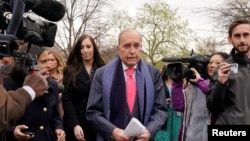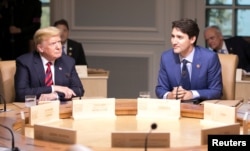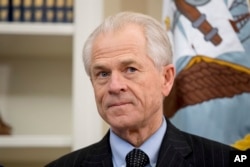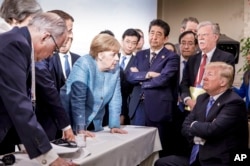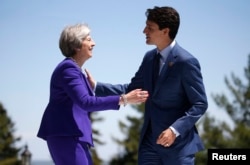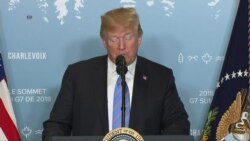Key White House advisers assailed Canadian Prime Minister Justin Trudeau on Sunday, contending that he "stabbed us in the back" and undermined U.S. President Donald Trump after Trump left the G-7 economic summit to head to Singapore for nuclear weapons talks with North Korean leader Kim Jong Un.
Trump economic adviser Larry Kudlow blamed the Canadian leader for saying at a news conference that new U.S. tariffs on aluminum and steel were "insulting," prompting Trump to direct U.S. officials to rebuff its allies and refuse to sign the traditional end-of-summit communique in Quebec.
"We leave and then he pulls this sophomoric political stunt for domestic consideration," Kudlow told CNN. "You just don't behave that way. It's a betrayal."
Kudlow said Trump had negotiated the communique in "good faith," and had called at the summit for "no tariffs, free trade." But Kudlow said that after Trump left the gathering hours early to head to Singapore, "He gets up in a plane and then ... Trudeau stabs him." He said Trump "is not going to let a Canadian prime minister push him around."
Kudlow added, "You can't put Trump in a position of being weak going into the meeting with Kim," where Trump is hopeful of negotiating the dismantling of Pyongyang's nuclear weapons program.
White House trade adviser Peter Navarro told Fox News, "There's a special place in hell for any foreign leader that engages in bad faith diplomacy with President Donald J. Trump and then tries to stab him in the back on the way out the door ... that's what bad faith Justin Trudeau did with that stunt press conference."
Navarro added, "To my friends in Canada, that was one of the worst political miscalculations of the Canadian leader in modern Canadian history. All Justin Trudeau had to do was take the win."
Trudeau did not respond to the U.S. attacks, instead declaring the summit a success.
"The historic and important agreement we all reached" at the summit "will help make our economies stronger & people more prosperous, protect our democracies, safeguard our environment and protect women & girls' rights around the world. That's what matters," Trudeau said.
Later Sunday, Canada Foreign Minister Chrystia Freeland said, "Canada does not believe that ad hominem attacks are a particularly appropriate or useful way to conduct our relations with other countries."
Kudlow defended Trump's suggestion that Russia be allowed to rejoin the G-7 group of seven of the world's most advanced economies, although none of the other six leaders showed any support for the idea. Russia was booted from the G-8 in 2014 after it annexed Ukraine's Crimean peninsula and threw its support to pro-Russian insurgents fighting Kyiv's troops in eastern Ukraine.
"Perhaps we should go back to the G-8," Kudlow said. "Russia is a player on the world stage."
As Trump was airborne, he instructed U.S. officials to not sign the communique issued by all seven leaders attending the gathering.
"Based on Justin's false statements at his news conference, and the fact that Canada is charging massive Tariffs to our U.S. farmers, workers, and companies, I have instructed our U.S. Reps not to endorse the communique as we look at Tariffs on automobiles flooding the U.S. Market!" Trump said on Twitter.
"PM Justin Trudeau of Canada acted so meek and mild during our @G7 meetings only to give a news conference after I left saying that, 'US Tariffs were kind of insulting' and he 'will not be pushed around.' Very dishonest & weak. Our Tariffs are in response to his of 270% on dairy!" Trump tweeted.
French President Emmanuel Macron assailed Trump's stance, saying, "International cooperation cannot be dictated by fits of anger and throwaway remarks." He called Trump's withdrawal from signing the communique a display of "incoherence and inconsistency."
"Germany stands by the jointly agreed communique," Germany spokesman Steffen Seibert said in a statement.
Trudeau closed the annual G-7 Summit in Canada Saturday by refusing to budge on positions that place him at odds with Trump, particularly the new steel and aluminum tariffs that have drawn the ire of Canada and the European Union.
He said in closing remarks that Canada will proceed with retaliatory measures on U.S. goods as early as July 1.
"I highlighted directly to the president that Canadians did not take it lightly that the United States has moved forward with significant tariffs," Trudeau said following the summit. "Canadians, we're polite, we're reasonable, but we will also not be pushed around."
British Prime Minister Theresa May echoed Trudeau, pledging to retaliate for tariffs on EU goods. "The loss of trade through tariffs undermines competition, reduces productivity, removes the incentive to innovate and ultimately makes everyone poorer," she said. "And in response, the EU will impose countermeasures."
In the U.S., a longtime Trump critic, Senator John McCain, the unsuccessful Republican presidential candidate in 2008, offered support for the other six world leaders at the Canadian summit.
"To our allies," McCain said, "Bipartisan majorities of Americans remain pro-free trade, pro-globalization & supportive of alliances based on 70 years of shared values. Americans stand with you, even if our president doesn't."
Trudeau and May also bucked Trump on another high-profile issue: Russia. Trump suggested Russia rejoin the group after being pushed out in 2014 over Russia's aggression in eastern Ukraine and its annexation of the Crimean peninsula. Trudeau said he is "not remotely interested" in having Russia rejoin the group, which comprises the world's seven most advanced economies.
May added, "We have agreed to stand ready to take further restrictive measures against Russia if necessary."
Wayne Lee, Steve Herman, Marissa Melton and Fern Robinson contributed to this report.
WATCH: President Trump on Trade




